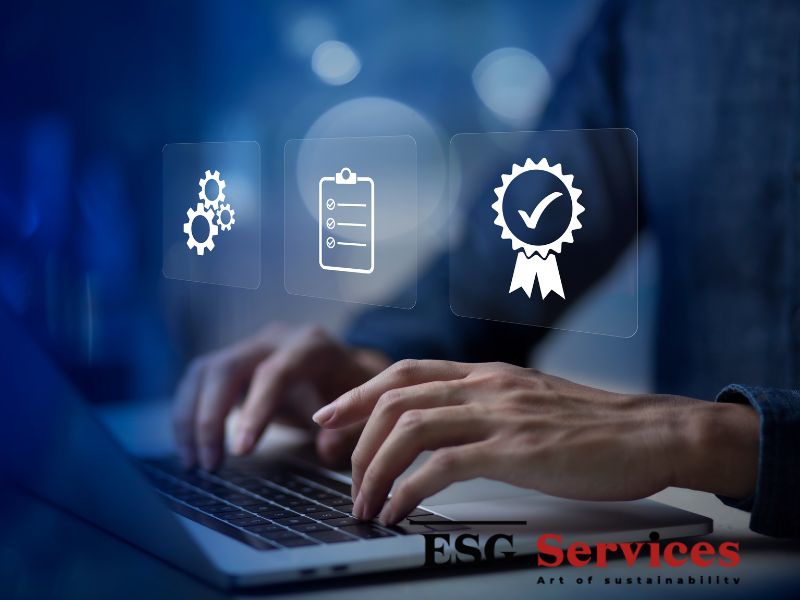Modern businesses operate in a rapidly changing environment, where sustainability is not just a trend but a necessity. ESG risk management (Environmental, Social, Governance) is a comprehensive approach that integrates environmental, social, and corporate governance aspects into a company's strategy, impacting its financial performance and reputation.
Benefits of ESG Risk Management
Incorporating ESG factors into the risk management system allows companies to:
- Enhance reputation: Companies that care for the environment and society are seen as responsible, which builds trust with customers and investors.
- Achieve long-term competitive advantage: Sustainable practices lead to innovation and better adaptability to changing market conditions.
- Reduce operational costs: Optimizing energy and resource use reduces business expenses.
- Access capital: Investors are increasingly favoring companies with solid ESG practices, facilitating access to financing.
- Meet regulatory requirements: Complying with ESG standards ensures alignment with current regulations and prepares the company for future sustainability regulations.
ESG Risk Management Examples in Different Areas
- Environment: Companies implement technologies to reduce CO₂ emissions, manage waste sustainably, and invest in renewable energy sources, thus securing energy prices and stability necessary for business operations.
- Biodiversity: Companies engage in projects aimed at protecting local ecosystems, such as reintroducing endangered species or rehabilitating degraded lands, thus avoiding potential legal costs related to biodiversity violations.
- Society: Companies promote gender equality, support the development of local communities, and ensure the health and safety of employees, leading to increased innovation and productivity.
- Supply Chain: Companies monitor their suppliers’ practices, ensuring stability and predictability, for example by tracking the sourcing of rare earth metals essential for the production of their goods.
- Governance: Companies adopt transparent management practices, including monitoring conflicts of interest, preventing corruption, and ensuring ethical business operations. This minimizes legal and reputational risks.
Regulations on Sustainable Development Risk Management
In response to the growing importance of sustainability, several regulations have been introduced to promote and enforce ESG practices in companies. In the European Union, the CSRD (Corporate Sustainability Reporting Directive) requires companies to report on ESG issues, aiming to improve reporting standards and promote sustainable economic development by standardizing and expanding the scope of reporting.
Furthermore, the European Banking Authority (EBA) has developed guidelines for managing ESG risks in the banking sector, emphasizing the integration of these aspects into financial risk management processes, which directly impacts businesses financed by banks.
Specific Disclosures in Sustainable Development Risk Management
IRO (Impacts, Risks, and Opportunities) are key elements of the European Sustainability Reporting Standards (ESRS) and the CSRD Directive. This framework helps companies identify and assess their key sustainability issues.
Key aspects of IRO:
- IRO Definition: IRO stands for Impacts, Risks, and Opportunities. These terms describe the key aspects companies must consider in relation to sustainability.
- Double Materiality: The IRO framework is part of the double materiality assessment required by CSRD. This involves identifying both the environmental and financial impact of a company’s activities.
- Impact Materiality: How a company’s business operations impact the environment and society (internal perspective).
- Financial Materiality: How external ESG factors affect the company’s operations (external perspective).
The IRO Triad forms the central foundation of ESRS. Companies must implement a process to identify, measure, and manage impacts, opportunities, and risks in order to report the success of their sustainability efforts. ESRS requires companies to describe how they identify and manage significant impacts, risks, and opportunities.
IRO categorization is as follows:
- Materiality: Is the IRO significant from an impact or financial perspective?
- Impact: Does it have a positive or negative impact, or does it represent a financial opportunity or risk?
- Status (only for impact materiality): Does the IRO have a real or potential impact?
- Value Chain: Does it concern the company’s own operations or those in the value chain, either upstream or downstream?
- Time Horizon: Is the impact short-term (less than a year), medium-term (1-5 years), or long-term (5+ years)?
Conclusion
ESG risk management is an integral element of modern business, enabling the creation of lasting value, minimizing potential risks, and maximizing the benefits of responsible operations. Integrating environmental, social, and governance aspects into a company’s strategy is key to achieving success in today’s increasingly conscious world.









